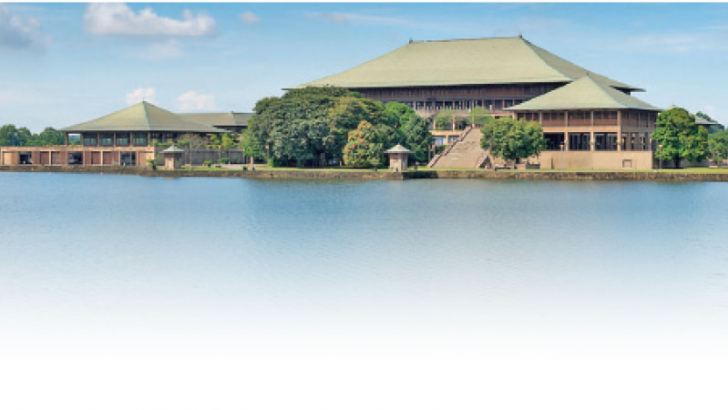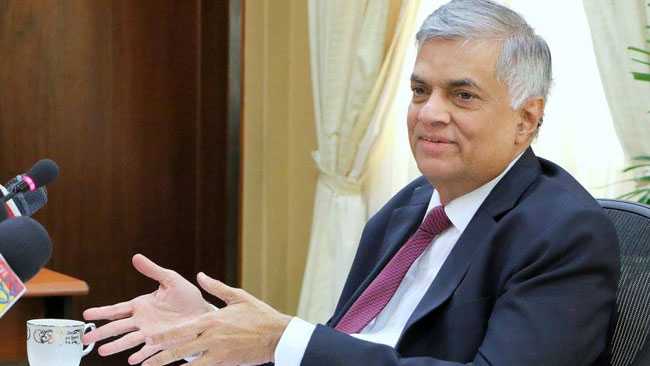With the divisions in the Sri Lanka Freedom Party (SLFP) and the United People's Freedom Alliance (UPFA) moving in the direction of an inevitable breakup of both the party and the alliance, the political debate is moving away from party issues to national issues; but with a lot of untruth and inconsistency coming from those opposed to matters of current importance.
As the battle of the Rajapaksa family to save whatever is left of its image recedes to the background of the political debate, with legal procedures against crime, corruption and fraud moving on, matters are made worse by the uncertainty of an early Local Government (LG) election. The Mahinda Rajapaksa leadership strategy is largely based on the LG polls, the support of what remains of the pro-Rajapaksa SLFP members of the local bodies, and MR's apparent commitment never to break away from the SLFP. This is certainly a political toss up of different possibilities, with Basil Rajapaksa's moves to be accepted as the next SLFP leader, while some expect brother Gotabhaya to step into those shoes.
 It is now evident that the strategies of the Joint Opposition (JO) are also distancing from the Rajapaksa leadership issue and towards other political issues, that will give them the appearance of a more independent group. Having gained some status within Parliament, not necessarily based on the MR leadership, the voices of the JO are getting louder against the proposed Economic and Technology Cooperation Agreement (ETCA) with India, and even the proposed arrangement for an Indian funded Ambulance Service in two provinces in the country.
It is now evident that the strategies of the Joint Opposition (JO) are also distancing from the Rajapaksa leadership issue and towards other political issues, that will give them the appearance of a more independent group. Having gained some status within Parliament, not necessarily based on the MR leadership, the voices of the JO are getting louder against the proposed Economic and Technology Cooperation Agreement (ETCA) with India, and even the proposed arrangement for an Indian funded Ambulance Service in two provinces in the country.
Neighbour India
Prime Minister Ranil Wickremesinghe has been forceful and determined to show the necessity for proper relations to be established with India, which is fast emerging as an economic giant not only in Asia, but in the world, too. The latest growth figures of India, which is closer to 7 %, have outstripped the rate of Chinese growth, which analysts believe to be much below its declared rate of near 6 % in the last quarter. The increasing rumbles in the international stock markets are also attributed in large measure to the emerging crisis in China, where the fall in growth is impacting negatively on the European Union, as well as many countries, both in Asia and Africa, dependent on China for the profitable sale of natural resources.
President Maithripala Sirisena did bring good news from his visits to Germany and Austria, with clear statements on a positive outlook for German investments in Sri Lanka, in manufacture and technology. There was also much better hope of the GSP plus issue on garment exports to the EU being resolved this year, as well as the restrictions on Sri Lankan fisheries exports to the EU to be removed in the coming months.
As much as our relations with strong economic forces such as the EU and its member states should improve for the progress of the Sri Lankan economy, it is of even greater importance that economic, commercial and technological relations with our closest economic giant - our immediate neighbour India, should improve even faster and much better.
Racism and xenophobia
The opposition to the proposed ETCA with India shows more of politicizing of an extremist nationalist nature, which is the stuff of the JO, now being expanded to one of xenophobia, about an invasion by Indian workers, both in the service and technological sectors, as well as the ordinary working class sector. Efforts are being made to drive fear into the minds of people, with strange and unreal comparisons, even about the IPKF presence here in the fight against the LTTE.
What is not being effectively explained to the people, and here the government too has its own share of blame, is that no ETCA would be effective without the approval of the Parliament of Sri Lanka, and the presenting of the proposed drafts of the ETCA to the public for proper discussion and analysis in the months ahead.
The marching of unemployed graduates demanding government employment, for which they are wholly unqualified, and the fears of certain professions, such as some in the medical profession, and some service sectors, should be addressed with utmost clarity, especially by the Prime Minister, who is taking the necessary lead in the campaign for the ETCA.
There was a time when the UNP did use the anti-Chinese slogan, against the Sirima Bandaranaike Government, when China donated and built the BMICH, the first major physical display of Chinese influence here, long after the Rubber-Rice Pact between our two countries, during the earlier UNP days. What the present government, and especially the UNP that has a majority within the governing coalition, is being targeted with is an anti-Indian slogan, that is moving in an extremist nationalist strategy, with a base on threats from Tamil Nadu, and what are claimed as wider Indian interests to hold Sri Lanka subject to Indian political and economic manipulation.
There are clear attempts to drive fear into the minds of Sri Lankans, especially the Sinhala Buddhist majority, that the ETCA is a stepping stone for Indian domination of the country, from the lowest paid workers, way up to technologists, personnel in the service sector and professions such as doctors. The strong support for the ETCA by the Prime Minister is also shown as an aspect of the rise of a new Indian capitalism to dominate this country, using the UNP's old image of being mainly pro-capitalist, with little regard for its current liberal democratic approach to social and economic issues.
The Chinese presence
It is necessary to ask those who warn of a swarm of Indians coming to the country after the ETCA, as to why they were silent at the large number of Chinese workers present in the country, especially during the Rajapaksa era, doing work from manual labour to higher technical work, and engineering and technological supervision, too. It is no secret that these Chinese workers, added to the improper figure of tourist arrivals in those years of war and tribulation, by their taking turns at work in Sri Lanka, being counted as tourists each time they arrived. There were also strong stories, especially in the international media, that a large number of such workers were prisoners serving time in Chinese jails. The size of this population is also seen by the simple fact that it did make way for an illegal trade in dog meat in some parts of the country, especially where they were engaged in building roads and other projects.
The important message to be conveyed, is that Sri Lanka cannot and should not, keep away from the growth that is taking place in India, and that it would be most foolish to turn our backs to the development within our closest neighbour. This does not mean that we must ignore the diverse issues facing Indian governance and democracy, such as the caste issues that have become a major problem today. The efforts to move closer to India in economic, commercial and technological relations are not in any way helped by the attitude of the Tamil Nadu Chief Minister Jayalalithaa and her AIADMK, especially on the most blatant poaching in the northern waters of Sri Lanka.
Yet we are faced with the reality of having an immediate neighbour that has certainly made major advances in diverse areas of economic growth and technology, that all our chants of cultural relations coming down from ancient times - with the arrival of Vijaya and the Sinhalese and that of Buddhism, will have little relevance in the future if we do not partner with India on the aspect of progress in modern development needs. It is indeed strange to read the letters in the media by some knowledgeable persons, who say we should ask India (with the USA and UK) to help our youth, especially graduates, to learn English, being wholly against having good economic relations with India, which could even lead to bridge building across the Palk Strait in the future.
It is evident from Prime Minister Ranil Wickremesinghe's commitment to the ETCA, that with all his political experience, especially so many years in the Opposition, he is fully aware that good relations translated into aspects of practical cooperation in the key aspects of modern growth with our immediate neighbour, is necessary for the next stage of progress of Sri Lanka.
There certainly are jobs here for Indians who we need. There are many skills that our youth could learn from India. Also, there are many more opportunities there for our youth and professionals to gain better training. Our relations with India should not be that of blindfolded, extremist nationalism. We must have a wider vision, in understanding our needs and the problems that could arise with new relations with India. Facing all this and moving forward is the path to progress, not towards India's embrace, but shaking hands for good purpose. The Palk Strait should not be the waterway for isolation, but the pathway to growth.




Add new comment